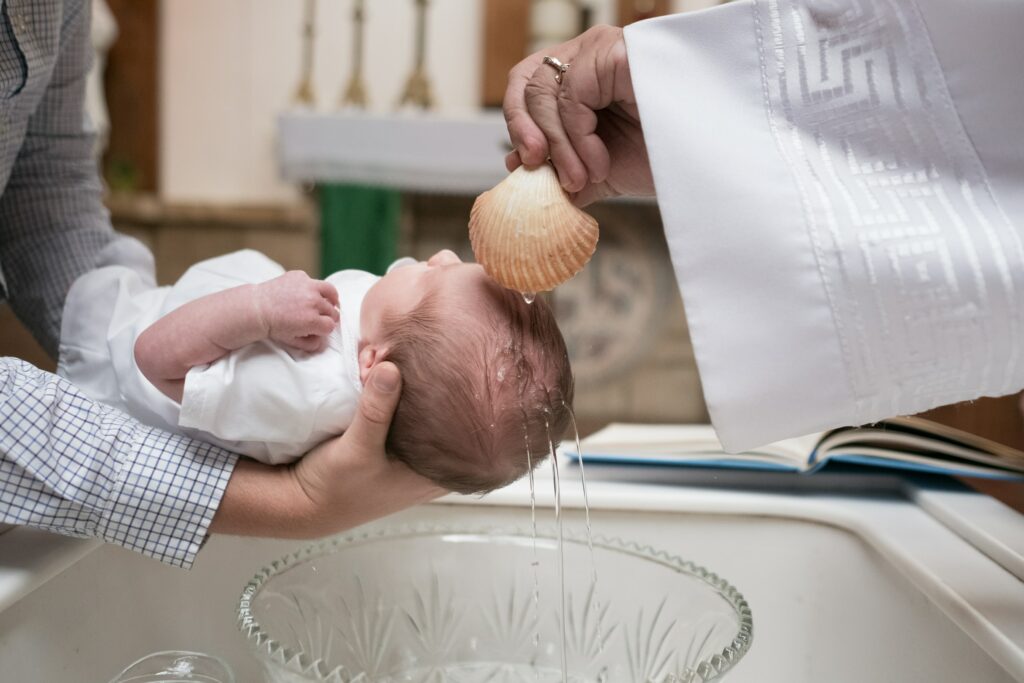Baptism
Author: Dr. Bob CaldwellWe acknowledge one baptism for the forgiveness of sins.

The Gospel of Mark opens with Jesus being baptized by John to begin His public ministry. All four gospels record Jesus’ baptism. Matthew records Jesus telling His followers to baptize believers, John tells us that Jesus’ followers baptized people during his ministry, and the Book of Acts repeatedly shows the church baptizing new believers.
Though it is not mentioned in the Old Testament, the Jews were practicing baptism by the time of Jesus. Different groups baptized in different ways and for different purposes. Commonly baptism was done by immersing the person in water. Going under water is a symbol of being cleansed in some way or as an initiation rite for new converts.
Under the guidance of the Holy Spirit, John and then Jesus established baptism as a spiritual declaration. By being baptized, the believer makes a public declaration of his or her intention to leave a life of sin and to live a godly life. Jesus taught the church to baptize all new believers. It symbolizes a decision to turn from sin and acceptance of the forgiveness that comes from following Jesus.
One Baptism?
The irony of quoting the creed’s “one baptism” is that there have been many competing ideas about what baptism is, what it does, and how and when it should be done throughout church history. The situation is no different today. The Bible teaches that baptism is an integral part of becoming a Christian. It does not always, however, answer some of the questions that we may raise. Therefore, there are many different traditions about baptism.
 If you are a believer, you should be baptized. The sections below will discuss the different issues surrounding baptism because you will encounter them at some point in your life in Christ. We want you to be informed.
If you are a believer, you should be baptized. The sections below will discuss the different issues surrounding baptism because you will encounter them at some point in your life in Christ. We want you to be informed.
The most important point to gain from the phrase “one baptism” is how it unites us, even if we don’t have the same idea about how to baptize. The sentence follows immediately from the sentence about “one church.” If one believer has been sprinkled and another immersed, they are still fellow-believers. If one believes their baptism was a symbol and the other believes their baptism actually saved them from sin, they are still fellow-believers.
What Does the Bible Say about Baptism?
1. Baptism was a normal part of Jesus’ ministry. First, he was baptized by John as an example (Matthew 3:13-17). He and his followers baptized people (John 3:22).
2. Jesus instructed his followers to baptize new believers (Matthew 28:18-20).
3. The apostles (Jesus’ main followers and church leaders) baptized people who were being saved (Acts 2:38-42; Acts 8:12; Acts 8:38; Acts 9:18; Acts 10:47-48; and many others).
4. The apostle Paul wrote about the spiritual implications of baptism in Romans 6. Obviously, most people see water as a cleaning agent. Paul compares being immersed in water to Jesus being laid dead in a tomb. The believer “dies” to sin, that is, he or she considers the sinful life as dead. Then, just as Jesus rose from the tomb to live again, the believer comes up from the water as a new person, alive in Christ and free from sin.
Does Baptism Save a Believer?
Many Christian churches believe the act of baptism actually brings salvation to the one who is baptized. However, while the Bible shows that baptism is important and often done at the time of a person’s conversion, belief in Jesus always comes before baptism. The Bible also teaches that we are saved when we believe (Romans 10:9-10).
The apostle Paul also taught that the outward actions of Judaism did not save a person (read the book of Galatians for his argument). Only faith in Jesus brings salvation. We do not believe that Paul replaced Jewish ceremonies with Christian ones. Therefore, baptism does not save a person, only Jesus does.
Must a Christian Be Baptized?
There are some Christian groups who do not practice actual baptism. Rather they believe that coming to Christ starts a type of “spiritual baptism.” They are correct in believing that coming to know Jesus is the important step. However, in the book of Acts, the Apostles always baptized new believers in water.
Historically, the church has taught that every believer should be baptized in water. The New Testament teaching does not imagine an unbaptized believer. However, we have already seen that baptism does not save a person; if a believer is never baptized, they will still be saved. Still, since Jesus commanded it, we should all be baptized.
When Should a Christian Be Baptized?
This is a divisive issue between Christian churches. The early church, along with many churches that arose after the Protestant Reformation in the 16th century, believe that only those who have come to have faith in Jesus should be baptized. Therefore, baptism should happen after a person believes in Jesus.
After the early church, the idea of baptism having saving power took hold among many. If baptism indeed saved a person, then they asked what is to become of children before they are old enough to have faith in Jesus. This led to baptizing infants. For many years, this was the belief of the entire church.
to have faith in Jesus. This led to baptizing infants. For many years, this was the belief of the entire church.
After the Protestant Reformation of the sixteenth century, groups of Christians who were reading the Bible came to the conclusion that only believers should be baptized. They did not baptize infants, but baptized children when they were old enough to understand what they were doing. They regarded infant baptism as invalid and would re-baptize adults who had been previously baptized as infants.
Since we do not believe that baptism saves a person, we cannot endorse the baptism of infants. When a person who is old enough to understand comes to believe in Jesus, that person should then be baptized.
Should a Christian Be Re-baptized?
Those who believe that baptism saves a person say that a person should only be baptized once. To do so a second time amounts to a denial of the effects of the first baptism.
As we saw in the last section, many churches today will re-baptize a believer if they were previous baptized as an infant. Conversely, some individuals accept their infant baptism as a symbol of what happened in their life later and choose not to be re-baptized.
There are also individuals who have chosen to be re-baptized if they doubt their salvation at the time of their conversion or if they were too young when they were baptized to remember it. Others have been known to be baptized again in the Jordan River on a trip to Israel.
We believe that believers should be baptized after conversion as a declaration to others that they have come to know Jesus. If this means being baptized again, then that is a good reason.

How Should Baptism Be Done?
The Greek word that is used to describe baptism was used in everyday Greek to refer to the practice of dyeing cloth or leather. This meant completely immersing the garment into the dye. It was also used to describe going completely under the water, like a sinking ship or drowning person.
Matthew 3:16 tells us that Jesus “came up” out of the water when he was baptized. According to John 3:23, John the Baptist was staying at a location “because water was plentiful there.” If John were only pouring water over people’s heads, plentiful water would not have been necessary. When the Ethiopian eunuch, who was listening to Philip explain salvation to him, saw a pool of water, he asked to be baptized there (Acts 8:36).
Finally, Paul compared baptism to being buried with Jesus in the tomb. Then, just as Jesus rose from the dead, we rise to a new life (Romans 6:3). This metaphor only makes sense if baptism is done by fully immersing a person in water.
This evidence, from both the Greek language and the Bible in which it was written, makes us believe that the proper way of baptizing is by immersing the entire person under water. We recognize that quite a few Christians and churches have done baptism by something less than full immersion. Since baptism does not save a person, the method is not as important as the act of being baptized. If you have been baptized as a believer, but were not immersed, you would not have to be baptized again.
Bob Caldwell, PhD, is Theologian-in-Residence at Network 211.
